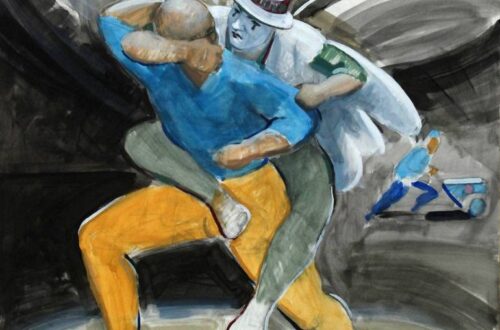Bible Studies
-
Genesis 3: The Fall
1. Genesis 3:1-13: 3 Now the serpent was more crafty than any of the wild animals the Lord God had made. He said to the woman, “Did God really say, ‘You must not eat from any tree in the garden’?”2 The woman said to the serpent, “We may eat fruit from the trees in the garden, 3 but God did say, ‘You must not eat fruit from the tree that is in the middle of the garden, and you must not touch it, or you will die.’”4 “You will not certainly die,” the serpent said to the woman. 5 “For God knows that when you eat from it your eyes…
-
Genesis 1:1-5
1. I don’t want to talk about all the various theories and explanations of creation this morning. Instead, I want to take a few minutes to give a perspective on the creation and then let Dr. Charley Gordon have a few minutes to do the same. 2. We often think about the Gospel as beginning in the New Testament. It doesn’t. It begins before the beginning. The good news was part of the founding of the world and the universe. Christ did not come along afterwards in the New Testament. The first thing to see in Creation is Christ – not the creation of man. Colossians 1:15-20: 15 The Son…
-
Amos 7:1-17
This morning I want to give some context for our guest teacher. I had asked her to be with us last week but she was in Houston. It turns out that this week is actually better as what she is doing and who she is are more directly related to the text. I am always glad when things work out that way. 1. Amos 7:14: “I was neither a prophet or a prophet’s son, but I was a shepherd, and I also took care of sycamore-fig trees. But The Lord took me from tending the flock and said to me, “Go prophesy to my people Israel.” Two things to remember…
-
Amos 5-6
1. “The biblical prophets continue to be the most powerful and effective voices ever heard on this earth for keeping religion honest, humble, and compassionate. Prophets sniff out injustice, especially injustice that is dressed up in religious garb. They sniff it out a mile away. Prophets see through hypocrisy, especially hypocrisy that assumes a religious pose. Prophets are not impressed by position or power or authority. They aren’t taken in by numbers, size, or appearance of success.” – Eugene Petersen’s introduction to Amos in The Message. Richard Stearns in the introduction to The Hole in Our Gospel. “What does God expect of us? That’s what this book is about. It’s a simple…
-
Hosea 13-14
1. The challenge of a long life is to stay vital and not drift. Not many of the leaders of Israel were able to be good for the long run. They eventually give in to deceit or drift or the ever present temptation to worship other gods. There are many strong starts but few that finish. Ephraim was exalted in Israel but he failed to finish well. It’s a question for us as well. Many of us have just made it through mid-life transition by the skin of our teeth and now we face the next challenge. It’s like climbing a mountain and finding out you are on a plateau…
-
Hosea 11-13: God and Mammon
Hosea 11-13: God and Mammon December 30, 2012 1. Read Hosea 11:1-4. It is difficult to come to grips with all the different images of God in Scripture. Even though people can say it is like a painting or a tapestry that can only be expressed in a thousand different strokes or threads, it is a challenge – at least for me. Different characteristics have been prominent in different parts of my life. Maybe it is the same for you. Of course, it is complicated by the fact that in English we have so few words to describe God – God, Father, Lord – and in Hebrew there were at…
-
Hosea 1:1-3:5
This is the beginning of Advent when we anticipate the coming of Christ – both his birth and His second coming. Because of that, Hosea is a good study for us as he describes conditions not unlike ours – instability, political infighting, chaos, power struggles, dissension, uncertainty, loss of faith in leadership, idolatry, corruption and disillusionment. But, his message is not just one of indictment but he is looking at the coming Savior and a new covenant of peace and security. 1. A little historical context. After the death of David, the Kingdom splits into the Northern Tribes (Israel) and the Southern Tribes (Judah) each with their own line of…
-
1 Peter 5:1-14
1. There is some literature we assign to younger people that is good for them to read but impossible for them to understand. I think many of Shakespeare’s plays fit this category as well as the book of Ecclesiastes. I might even put Peter’s letters in that category. His letters to the young church are written from the perspective of an older and wiser man who has experienced a great deal of suffering before he wrote. Peter could not have written these letters as a young man. 2. In spite of his position in the church and the respect with which he is held he writes this as an appeal…
-
1 Peter 2:18-25
1. There are several sub-themes in the passage this morning but they all support the major theme about which Peter is writing the church: the rules of our relationships with people in our lives. This first verse and the final verse serve as book-ends in a way. The term “submit” carries a good deal of baggage and it is oftentimes used to mean “cringe in fear” or be like a broken horse. It is not that at all. It is a military term that means we have a place in our unit where we play a role. Playing that role and accepting the rightful authority of the officer in charge…
-
1 Peter 2:11-17
These are big themes this morning and they are about the tensions in the life of a Christian. In some ways they reflect the tension in the life of Peter himself – an impetuous firebrand when young and now an older and more moderate leader of the early church. They reflect the tension of the young believers working to figure out their identity. Are they Jewish or Gentile? Should they fight for their freedom as a right or some remain slaves? What is their purpose as a church and believers? When will the Lord return and what should they do between now and then? What is their relationship to corrupt…


